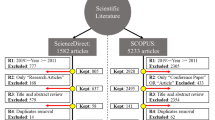Abstract
Robust capacity improvement tactics, namely acquisition of assets and enhanced flexibility in product manufacturing, that alleviate mismatches between required and available capacity are revealed by data analytics. Improvement brought about by these tactics as measured by two performance metrics, production makespan and product availability, is assessed using optimization methodology. This paper demonstrates the value of analysing demand and product specification data to inform capacity re-calibration in an S&P 500 company in the chemical industry. The tactic recommended for implementation, which yielded up to a doubling of the capacity, emerged from an empirical analysis of data for five prototypical planning periods.


Similar content being viewed by others
References
Applequist G, Samikoglu O, Pekny J and Reklaitis G (1997). Issues in the use, design and evolution of process scheduling and planning systems. ISA Transactions 36 (2): 81–121.
Bassett MH, Pekny JF and Reklaitis GV (1997). Using detailed scheduling to obtain realistic operating policies for a batch processing facility. Industrial and Engineering Chemistry Research 36 (5): 1717–1726.
Blazewicz J, Dror M and Weglarz J (1991). Mathematical programming formulations for machine scheduling: A survey. European Journal of Operational Research 51 (3): 283–300.
Blömer P and Günther HO (1998). Scheduling of a multi-product batch process in the chemical industry. Computers in Industry 36 (3): 245–259.
Bowman EH (1959). The schedule-sequencing problem. Operations Research 7 (5): 621–624.
Brandenburg M and Tölle F-J (2009). MILP-based campaign scheduling in a specialty chemicals plant: A case study. OR Spectrum 31 (1): 141–166.
Erdirik-Dogan M and Grossmann IE (2006). A decomposition method for the simultaneous planning and scheduling of single-stage continuous multiproduct plants. Industrial and Engineering Chemistry Research 45 (1): 299–315.
Floudas CA and Lin X (2004). Continuous-time versus discrete-time approaches for scheduling of chemical processes: A review. Computers & Chemical Engineering 28 (11): 2109–2129.
Gaglioppa F, Miller LA and Benjaafar S (2008). Multitask and multistage production planning and scheduling for process industries. Operations Research 56 (4): 1010–1025.
Grossmann I (2005). Enterprise-wide optimization: A new frontier in process systems engineering. AIChE Journal 51 (7): 1846–1857.
Grossmann IE, Van den Heever SA and Harjunkoski I (2002). Discrete optimization methods and their role in the integration of planning and scheduling. AIChE Symposium Series, no. 326 98: 150–168.
Günther HO and van Beek P (2003). Advanced Planning and Scheduling Solutions in Process Industry. GOR-Publications, Springer: Germany.
Kallrath J (2002). Planning and scheduling in the process industry. OR Spectrum 24 (3): 219–250.
Kondili E, Pantelides CC and Sargent RWH (1993). A general algorithm for short-term scheduling of batch-operations. 1. MILP formulation. Computers and Chemical Engineering 17 (2): 211–227.
Majozi T and Zhu XX (2001). A novel continuous-time MILP formulation for multipurpose batch plants. 1. Short-term scheduling. Industrial & Engineering Chemistry Research 40 (25): 5935–5949.
Manne AS (1960). On the job-shop scheduling problem. Operations Research 8 (2): 219–223.
Maravelias CT (2012). General framework and modeling approach classification for chemical production scheduling. AIChE Journal 58 (6): 1812–1828.
Maravelias CT and Grossmann IE (2003). Minimization of the makespan with a discrete-time state-task network formulation. Industrial & Engineering Chemistry Research 42 (24): 6252–6257.
Maravelias CT and Sung C (2009). Integration of production planning and scheduling: Overview, challenges and opportunities. Computers and Chemical Engineering 33 (12): 1919–1930.
Méndez CA, Cerda J, Grossmann IE, Harjunkoski I and Fahl M (2006). State-of-the-art review of optimization methods for short-term scheduling of batch processes. Computers and Chemical Engineering 30 (6–7): 913–946.
Pantelides CC (1994). Unified frameworks for the optimal process planning and scheduling. Proceedings of the Second Conference on Foundations of Computer Aided Operations, Austin, TX, pp 253–274.
Pinedo M (2012). Scheduling: Theory, Algorithms, and Systems. 4th edn. Springer: New York, USA.
Pinto JM and Grossmann IE (1995). A continuous-time mixed-integer linear-programming model for short term scheduling of multistage batch plants. Industrial & Engineering Chemistry Research 34 (9): 3037–3051.
Pinto JM and Grossmann IE (1998). Assignment and sequencing models for the scheduling of process systems. Annals of Operations Research 81 (1): 433–466.
Pochet Y and Wolsey L (2006). Production Planning by Mixed Integer Programming. Springer Series in Operations Research and Financial Engineering. Springer: New York, USA.
Pritsker AAB, Watters LJ and Wolf PM (1969). Multiproject scheduling with limited resources: a zero-one programming approach. Management Science 16 (1): 93–108.
Shah N (1998). Single- and multisite planning and scheduling: Current status and future challenges. AICHE Symposium Series 94 (320): 75–90.
Author information
Authors and Affiliations
Corresponding author
Rights and permissions
About this article
Cite this article
Ali, A., Ghoniem, A. & Franke, A. Evaluating capacity management tactics for a legacy manufacturing plant. J Oper Res Soc 65, 1361–1370 (2014). https://doi.org/10.1057/jors.2013.82
Received:
Accepted:
Published:
Issue Date:
DOI: https://doi.org/10.1057/jors.2013.82




